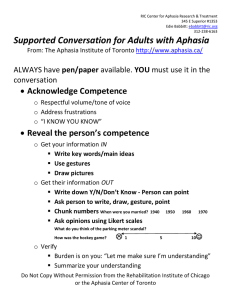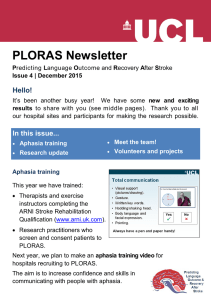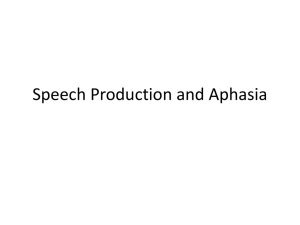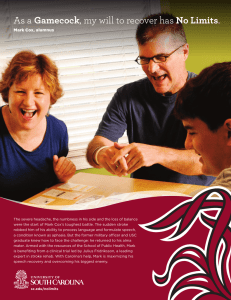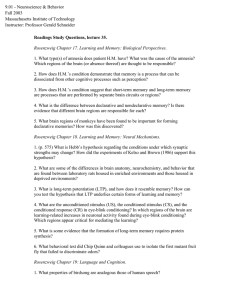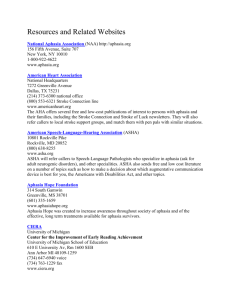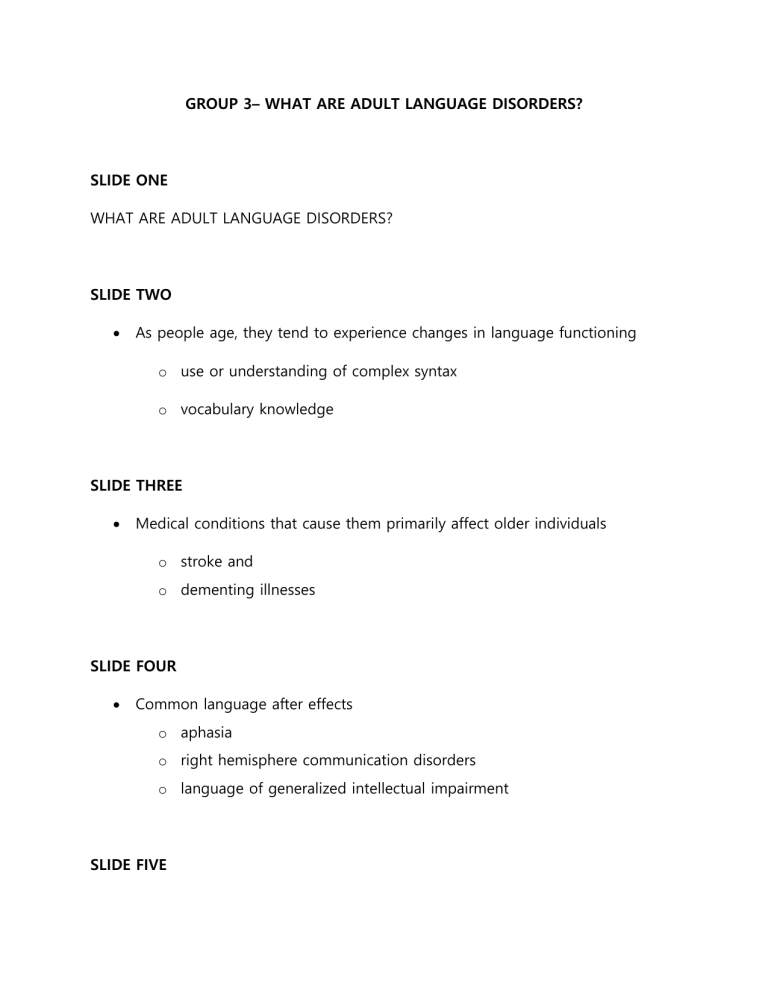
GROUP 3– WHAT ARE ADULT LANGUAGE DISORDERS? SLIDE ONE WHAT ARE ADULT LANGUAGE DISORDERS? SLIDE TWO As people age, they tend to experience changes in language functioning o use or understanding of complex syntax o vocabulary knowledge SLIDE THREE Medical conditions that cause them primarily affect older individuals o stroke and o dementing illnesses SLIDE FOUR Common language after effects o aphasia o right hemisphere communication disorders o language of generalized intellectual impairment SLIDE FIVE What is APHASIA? o A communication disorder that results from damage to the parts of the brain that contain language (typically in the left half of the brain) o Right side of the brain: additional difficulties beyond speech and language issues (e.g. stroke) The National Institute on Neurological Disorders and Stroke estimates that approximately one million individuals suffer from aphasia in the United States SLIDE SIX Causes of Aphasia o Stroke o Any disease or damage to the parts of the brain that control language Brain tumors Traumatic brain injuries Progressive neurological disorders. SLIDE SEVEN Aphasia may cause difficulties in: o Speaking o Listening o Reading o Writing o DOES NOT AFFECT INTELLIGENCE SLIDES EIGHT TO NINE Signs and Symptoms of Aphasia o Difficulty producing language: Experience difficulty coming up with the words they want to say Substitute the intended word with another word that may be related in meaning to the target (e.g., "chicken" for "fish") or unrelated (e.g., "radio" for "ball") Switch sounds within words (e.g., "wish dasher" for "dishwasher") Use made-up words (e.g., "frigilin" for "hamburger") Have difficulty putting words together to form sentences String together made-up words and real words fluently but without making sense SLIDES TEN TO ELEVEN Signs and Symptoms of Aphasia o Difficulty understanding language: Misunderstand what others say, especially when they speak fast (e.g., radio or television news) or in long sentences Find it hard to understand speech in background noise or in group situations Misinterpret jokes and take the literal meaning of figurative speech (e.g., "it's raining cats and dogs") SLIDES TWELVE TO FOURTEEN Signs and Symptoms of Aphasia o Difficulty reading and writing: Difficulty reading forms, pamphlets, books, and other written material Problems spelling and putting words together to write sentences Difficulty understanding number concepts (e.g., telling time, counting money, adding/subtracting) SLIDES FIFTEEN TO SIXTEEN How is aphasia diagnosed? o The SLP evaluates the individual with a variety tools to determine the type and severity of aphasia. It includes assessment of: Auditory Comprehension: understanding words, questions, directions, and stories that are spoken Verbal Expression: producing automatic sequences (e.g., days of the week), naming objects, describing pictures, responding to questions, and having conversations Reading and Writing: understanding or producing letters, words, sentences, and paragraphs Functional Communication: using gestures, drawing, pointing, or other supportive means of communication when he/she has trouble getting a point across verbally SLIDES SEVENTEEN TO EIGHTEEN Treatments available for people with aphasia: o The type of treatment depends on the needs and goals of the person with aphasia. Individual or group sessions Improve specific language skills affected by damage to the brain SLP also helps the person with aphasia develop and use strategies to improve overall communication in a variety of situations (e.g., life participation approach to the treatment of aphasia) SLIDE NINETEEN Treatments available for people with aphasia: o Later on recovery The SLP may work with a vocational specialist to help the person return to work or school, if appropriate The SLP may also work with employers and/or educational specialists to implement the use of compensatory strategies in these settings and may work with them to modify the environment to meet language needs SLIDES NN to MM What can I do to communicate better with the person with aphasia? o Get the person's attention before you start speaking. o Maintain eye contact and watch the person’s body language and use of gesture. o Minimize or eliminate background noise (TV, radio, other people). o Keep your voice at a normal level. Do not speak loudly unless the person asks you to do so. o Keep communication simple, but adult. Don't "talk down" to the person with aphasia. o Simplify your sentence structure and emphasize key words. o Reduce your rate of speech. o Give the individual time to speak. Resist the urge to finish sentences or offer words. o Communicate with drawings, gestures, writing, and facial expressions in addition to speech. o Encourage the person to use drawings, gestures, and writing. o Use "yes" and "no" questions rather than open-ended questions. o Praise all attempts to speak and downplay any errors. Avoid insisting that that each word be produced perfectly. o Engage in normal activities whenever possible. o Encourage independence and avoid being overprotective. SLIDE VDSVSV Organizations o Academy of Neurological Communication Sciences and Disorders o Aphasia Hope o National Aphasia Association o Stroke Association SLIDE DSVSDVSFV Right hemisphere language disorders o Can result from stroke. o Affects the side of the brain that is not dominant for language o Strokes that are restricted to the right hemisphere in older adults appear to have little effect on phonology, morphology, or syntax, and their consequences for lexical-semantic processing are unclear o Adults with right hemisphere damage can be particularly impaired in pragmatic aspects of language. SLIDE SDFSDGSG Language of generalized intellectual impairment (Wertz) o Is a diagnostic label that refers to language disorders resulting from neurologically degenerative processes such as Alzheimer's disease o Both sides of the brain typically are affected by the degenerative process o May have a constellation of language deficits that includes any or all that typify aphasia and right hemisphere language disorders o Have other cognitive deficits: memory and attention: cause, contribute to, or confound their language symptoms. LAST SLIDE REFERENCES http://www.asha.org/ http://medicine.jrank.org/
